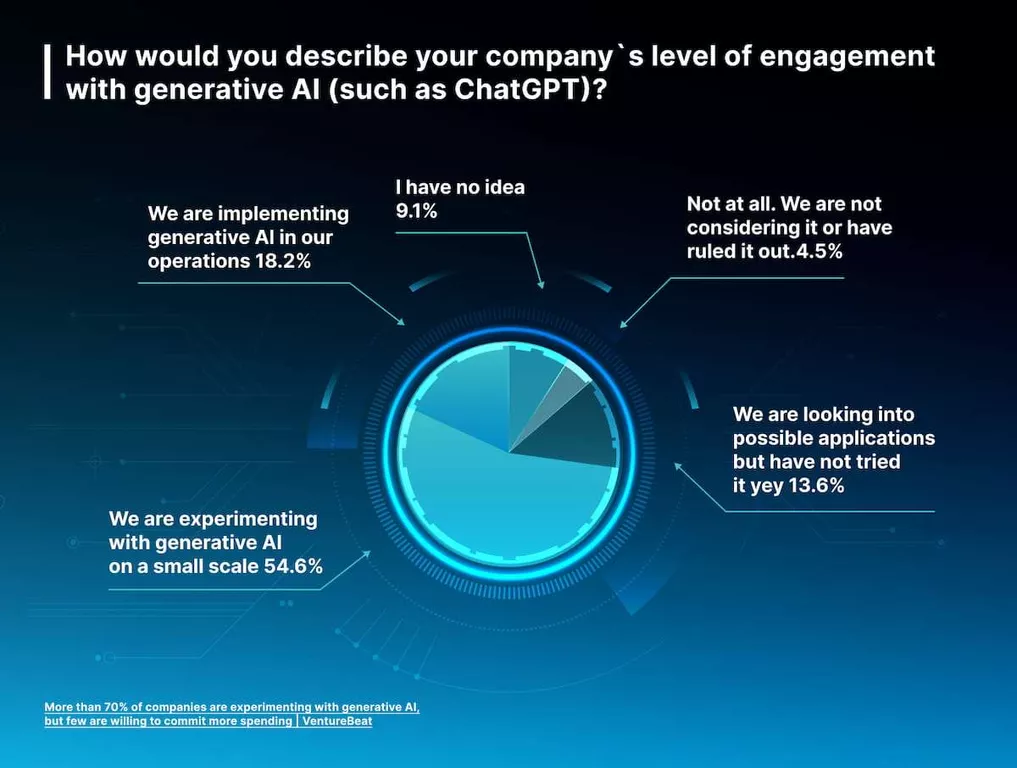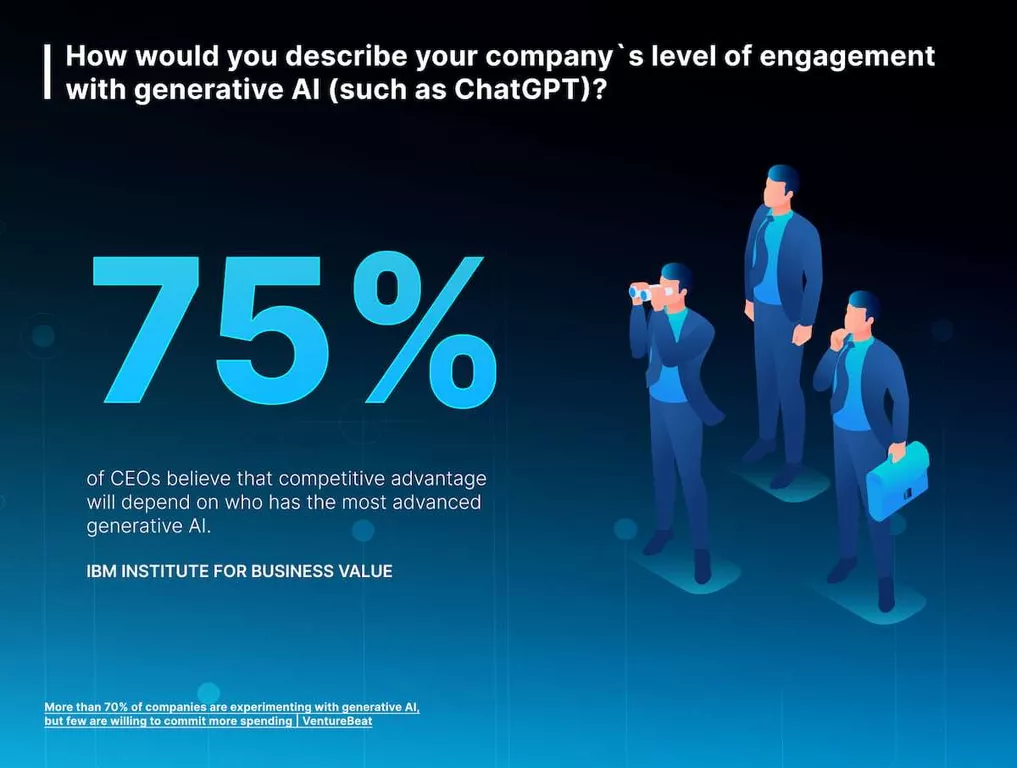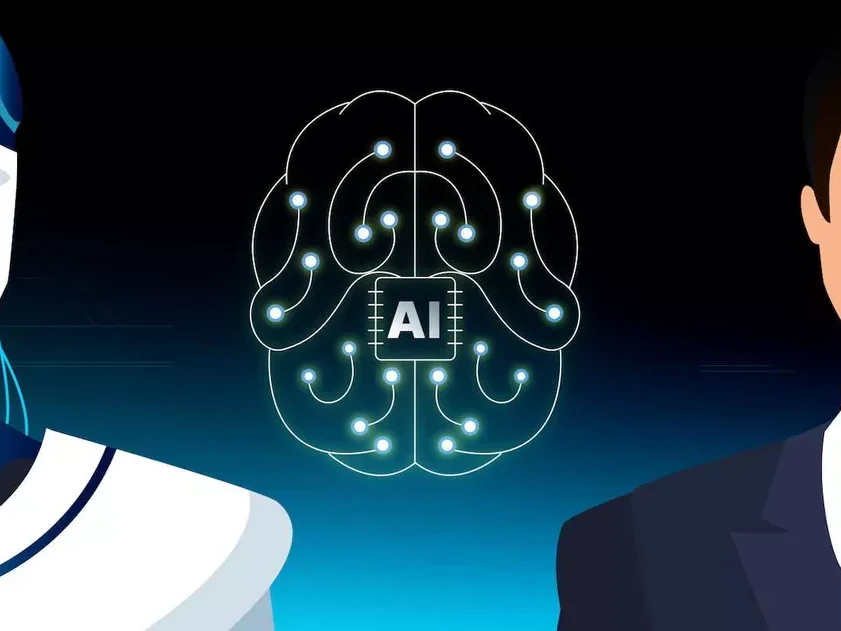AI is slowly permeating every aspect of our lives, from shopping to autonomous vehicle controls to cell phones. Moreover, it impacts the business environment. AI can transform your company — productivity may grow by 0.1-0.6% per year by 2040 due to generative AI, depending on the rate of technology adoption. Understanding how to comprehend the implications of AI in enterprises is critical. Analysts predict, by the end of 2023, AI’s value will skyrocket to a staggering $190 billion worldwide.
As a result, it should come as no surprise that companies lacking the courage to implement AI risk falling behind. Executives must tap AI’s potential and financial benefits to stay ahead of the curve. In the article, we’ll touch on CEO AI’s value and strategies to its application.
Generative AI: What Is It, and Why Does It Matter?
Generative AI for business is the kind of tech that grows by producing one-of-a-kind content. Discriminative AI analyzes differences across several data sets, while generative models continually collect data. As Goldman Sachs states, employing generative AI may raise the world GDP by 7%, or around $7 trillion. Furthermore, productivity gains from AI seem to be 1.5% over the next ten years.
CEOs may improve their company’s operations by utilizing AI in numerous ways. Automated data analysis for performance measures is one such example. Executives may effectively handle and analyze enormous volumes of data to discover areas for development, obtain insightful knowledge about their company’s performance, and make data-driven choices by employing AI-powered algorithms.
CEOs may also use predictive analytics as a robust tool for decision-making. They can examine past data, spot trends, and forecast future trends with precision by utilizing AI algorithms.
The latest AI applications simplify repetitive tasks like data classification and reorganization. Nevertheless, CEOs should avoid total technological immersion. Instead, they should focus on how generative AI might affect their sectors and ventures and what tactical choices might allow them to make the most out of the possibilities and overcome the obstacles. Three fundamental pillars are the emphasis of the selection:
- Potential. Determine how AI can differentiate you from others.
- Personnel. Prepare employees to use AI.
- Policy. Pay attention to the legal regulations.
Software with AI has the power to fundamentally alter how companies run, boosting productivity while cutting expenses. AI automation may assist companies in streamlining their processes, lowering errors, and increasing department productivity without hiring new workers. As an illustration, a MetaDialog product aims to enhance your business. You may integrate specialized technology, such as safe multilingual generative AI, into your company operations. The software allows human agents to focus on more important tasks by automating complex customer interaction scenarios.

3 Strategies How CEOs Can Use Generative AI
According to a significant majority of CEOs, generative AI for executives may enhance creativity (80%), discovery (82%), innovation execution (74%), and partner cooperation (77%). Here are four strategies of how CEOs might maximize the advantages of AI:
A new breath for customer support
AI for CEOs is significant if you work in a business where providing prompt customer service is a must. Your managers handle hundreds of inquiries daily, but occasionally, they don’t respond quickly enough. Customer unhappiness results from it. You might apply a generative AI bot in customer care to address the issue. The main objective is responsiveness that aligns with client preferences and brand alignment. The MetaDialog product is one such example. A multilingual conversational interface supports many messengers and is simple to incorporate.
Generative AI offers customer support agents more time to focus on intricate inquiries. Their productivity and work happiness will both rise. Client satisfaction and work standards will also grow. The sophisticated bot can retrieve all internal customer info by storing prior encounters, including phone conversations.
The solution might have a significant impact on the financial and healthcare industries. When it comes to healthcare, Florence is a bot which monitors your symptoms, reminds you to take your medication on time, and helps you contact a doctor. As an illustration for financial applications, Mastercard utilizes a bot on Facebook Messenger to notify consumers of every new offer. At the same time, Bank of America Eric’s virtual assistant can take queries by text and voice and arrange a payment. MetaDialog chatbots assist with customer service by handling basic inquiries and cutting down on client wait times. Additionally, you may use them to offer customized financial counsel to clients based on their spending patterns. It also aids in spotting unusual trends and possible fraud. Artificial Intelligence adds another degree of protection by identifying any strange financial activity.
Changing software engineering with AI integration
Software businesses can release an AI-powered code completion solution in response to the backlog created by a lack of qualified engineers. This technology uses natural language interpretation to understand descriptions. It provides code blocks, aiding debugging and potentially accelerating code development by up to 50%.
More seasoned engineers gain from these resources than less experienced ones. While CEO AI increases productivity, it won’t replace qualified engineers and might not provide beginners with the best outcomes. Because AI-generated code tends to be vulnerable, maintaining code quality and security is still essential. The monthly cost of an off-the-shelf AI instrument varies from $10 to $30 per user, and negotiations are required about license and intellectual property problems. A small staff overseeing performance, IP compliance, and security makes minor workflow tweaks easier to execute.
Sprucing up marketing
Generative AI is a game-changer to marketers since it opens up new ideas. At first, copyright issues about the generated photographs prevented commercial use. Nonetheless, well-known creative software providers have advanced their versions by utilizing databases of stock images. Professionals in marketing may now use these technologies, which eases concerns around copyright. This tool, which adheres to brand requirements about fonts, colors, and shapes, quickly identifies and generates appropriate pictures for brand managers seeking quick ad production in only minutes.
These AI-powered image generators help create logos, social media videos, and product images, meeting various marketing objectives. The marketer’s job changes as generative AI becomes more incorporated into corporate processes. As marketers gain expertise in using CEO AI to create and customize campaigns, marketing tactics transform.

Tips and Reminders When Using AI
Having several considerations in mind is vital to get the most out of AI. They’ll help you concentrate on moments that are easy to overlook:
- Don’t rely just on one artificial intelligence CEO tool. Instead of seeking a single universal AI, the best action of businesses — mainly medium-sized and more significant — will be to deploy a scope of tools.
- Create a thorough set of ethical guidelines for AI use that reflect the fundamental ideals of your company — responsibility, justice, openness, and privacy. Give sensitive data protection first priority and make AI systems understandable and transparent.
- Ensure that AI projects align with strategic company goals. Every AI project must have a distinct aim that substantially contributes to the results. Create key performance indicators (KPIs) to monitor how these projects affect overarching business objectives.
- Stay informed about the constantly evolving legal landscape surrounding AI. Guarantee that your projects adhere to industry regulations, data protection laws, and ethical guidelines stipulated by governing bodies. Foster transparency of AI algorithms and facilitate the demonstration of compliance with legal inquiries, if necessary.
To cap it all, CEOs must realize that while AI augments human capabilities, it does not entirely replace them. A significant portion of generative AI’s use within enterprises will come from staff members utilizing capabilities in their current software.
Summing Up
In the future, Gen AI may completely change how CEOs and companies run. It facilitates decision-making, fosters creativity, and provides insightful information. Executives may use generative AI to boost innovation, increase productivity, and give consumers individualized experiences. It’s significantly easier when you use MetaDialog. The team provides an AI solution that conforms to all policies and procedures inside the organization. It is entirely safe and deploys both on-site and in the cloud. All of your data is secure in any case. When you’re ready to join the AI community, check out our enterprise AI platform.
